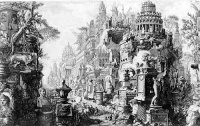Template:Featured article
From The Art and Popular Culture Encyclopedia
(Difference between revisions)
| Revision as of 16:53, 20 April 2008 Jahsonic (Talk | contribs) ← Previous diff |
Revision as of 16:53, 20 April 2008 Jahsonic (Talk | contribs) Next diff → |
||
| Line 2: | Line 2: | ||
| <br> | <br> | ||
| If this wiki were a [[city]], it would feature prominently [[nightclub]]s, [[record store]]s, a [[red light district]]s, [[museum]]s, [[library|libraries]], [[second hand book]] stores and [[Comic book|comic]] shops.]] | If this wiki were a [[city]], it would feature prominently [[nightclub]]s, [[record store]]s, a [[red light district]]s, [[museum]]s, [[library|libraries]], [[second hand book]] stores and [[Comic book|comic]] shops.]] | ||
| - | {{Template}} | + | |
| Welcome to '''Art and Popular Culture''', a [[nobrow]] wiki for the [[lofty|loftiest]] of [[intellectual]]s and the most [[jaded]] [[hedonists]]; exploring the [[hidden]] links between "[[mainstream]]" and "[[underground]]" culture. | Welcome to '''Art and Popular Culture''', a [[nobrow]] wiki for the [[lofty|loftiest]] of [[intellectual]]s and the most [[jaded]] [[hedonists]]; exploring the [[hidden]] links between "[[mainstream]]" and "[[underground]]" culture. | ||
Revision as of 16:53, 20 April 2008

Antichita Romanae (1748) by Piranesi
If this wiki were a city, it would feature prominently nightclubs, record stores, a red light districts, museums, libraries, second hand book stores and comic shops.
If this wiki were a city, it would feature prominently nightclubs, record stores, a red light districts, museums, libraries, second hand book stores and comic shops.
Welcome to Art and Popular Culture, a nobrow wiki for the loftiest of intellectuals and the most jaded hedonists; exploring the hidden links between "mainstream" and "underground" culture.
It features these themes and sensibilities and keywords via these artists and theorists. And a bibliography.
Methodology
- "Method of this work: literary montage. I have nothing to say only to show." -- Passagenwerk (1927 - 1940) by Walter Benjamin
- The "rhizome" allows for multiple, non-hierarchical entry and exit points in data representation and interpretation. --Mille Plateaux - Gilles Deleuze and Félix Guattari, volume 2 of Capitalisme et Schizofrénie (1980)
Biases
- Contrary to the guidelines of Wikipedia, this wiki allows original research and will preferably have a publication bias favoring appreciative criticism.
- In biographies, lots of attention will be given to romantic involvements (cherchez la femme and cherchez l'homme) and means of subsistence.
- Geography: Europe, United States, cross-fertilization between both and French culture.
- Geographical bias: Eurocentrism, Francophilia
- If the wiki were a city, it would feature prominently nightclubs, record stores, a red light districts, museums, second hand book stores and comic shops.
- Notability criteria are different from Wikipedia's. They will be along the lines of artpopcult's POV; see these themes and sensibilities and keywords, canonical artists and theorists
- Body genres
- Preference for otherness and alterity
- Namesakes: importance of homonymy and paronymy are important and strenghten self-referentiality of the wiki.
- General: bias towards the cultish, the transgressive and the nobrow; stereotypical representations
- Music: bias towards black music and underground music
- Film: bias towards cult films, a total disregard Academy Awards
- Fiction: bias towards cult fiction, disregard for Nobel prizes, a bias towards film adaptations
- Art: bias towards the transgressive, erotic, fantastique and grotesque
- Genre: Fantastique preferred over fantasy.
